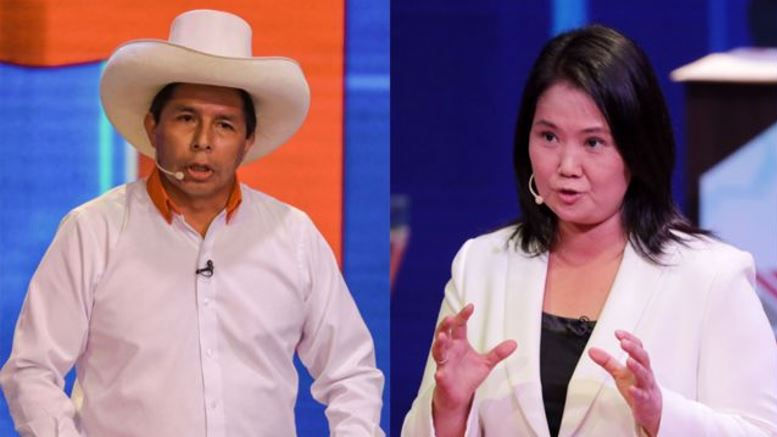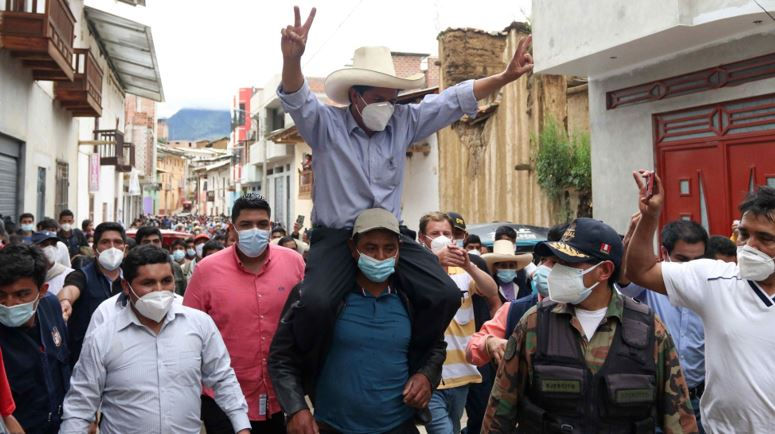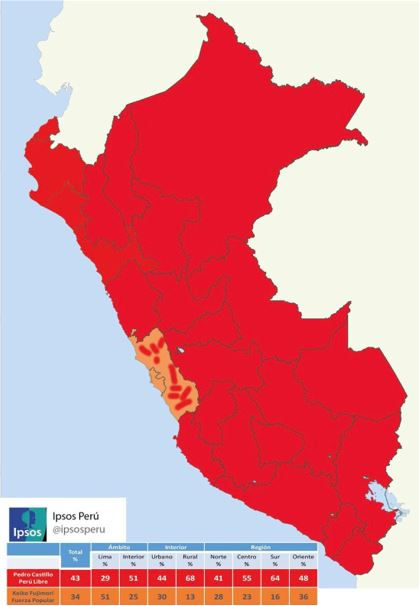Our Biggest Obstacle
- Mauricio Vargas
- May 5, 2021
- 6 min read
The latest national presidential survey conducted by the IPSOS showed an overwhelming support for a candidate that, a month and a half ago, had around 6% of vote intention. Despite that, three weeks ago he won the first round of our elections with an all-time low percentage (for a winner) of 19%. Now, his estimated support for the second-round hits 43%, nine percent more than his rival who has 34%[1]. Let’s talk a little about both of them.

If things stay the same, the virtual winner is a 51-year-old elementary school rural teacher called Pedro Castillo. His ideals belong to the left side of the sociopolitical spectrum, the side that has always been popular amongst the people but tremendously feared by the establishment. His radical discourse has benefitted from (or maybe, originated from) the massive damage that the COVID-19 pandemic has done to our society, in the sense that it has exposed all of the system’s flaws that had previously been covered up by a continuous economic growth. Adding to that, we have been experiencing a monumental political crisis which is perfectly demonstrated by the number of ex-presidents that we have right now either in jail, or under very serious investigation. The result of both of these things is an enormous popular dissatisfaction with the politicians, which all seem to be corrupt, liars and thieves; and the economic model, which evidently only favors a select few amount of people. We can specifically mention two examples for both of these issues.
Referring to the lack of confidence towards politicians, we can mention our very last president, Martin Vizcarra, who was vacated by the congress in a legal, but illegitimate way, which sparked massive protests all around the country against what most considered a coup. Police brutality, like always, stole the show, repressing everyone it could in the capital of Lima, leading to the killings of two young men and the injuries of many others.
But before all that, Vizcarra’s government had massive popular support, even reaching 60% of approval last August [2]. He was very much liked because he fought against the congress (which everyone hated) and because he seemed honest, firm, and just plain trustworthy. All of that until the “vacuna-gate [3] (vaccine-gate)” scandal occurred, which exposed him, some of his ministers and a lot of other authorities for using their influences to get themselves vaccinated in secret before everyone else (even before any acquisition deals were signed). This was like a slap to the face for most Peruvians, because the one politician that seemed earnest, was just the same or maybe even worse than all the others, the ones he claimed to fight against. We should bear this in mind for later.

Now, referring to the failure of the government’s response to the pandemic, we could write a book mentioning every single mistake made during the last twenty years by more then five presidents that led to our country being one of the most affected worldwide by COVID-19 (we possess the record of most deaths per million people [4]). But we can summarize by saying that the government has done little to nothing, even with all of its resources, to improve the quality of the public services like health and education; to strengthen the political and judiciary institutions, and to unify our very centralized country.
Now that we understand the context, I’ll talk about my perceptions.
We live in a country in which 34% of the people have a monthly income of about 340$ USD[5], while others actually believe they are living in a developed, first-world country. They are the ones who believe that our economic model is a huge success justifying themselves by the stats that showed constant economic growth for the last 15 years, while ignoring the uneven wealth distribution or the indicators of educational quality (we are ranked 64th out of 77 countries in the PISA report [6]). The majority of our right-wing politicians and civilians belong within the far right, as they consistently oppose state intervention and think that the private sector should be in charge of providing basic services for a price, totally disregarding public health and educational systems.
Most of them live in Lima, others in different cities, but they also tend to pay more attention to their immediate surroundings and what’s going on in America than to what’s going on inside their country, away from the big cities. That may explain the reason why it shocks them how, every five years, a complete unknown character (to them at least) rises up as the next potential president. There is no desire in them to understand the reasons behind a vote to a person like Castillo, they just criticize with racist, classist and condescending speeches, saying things like: “if someone votes for Castillo, they must be mentally disabled or terrorists.” They look at their fellow countrymen from above, with despise and a feeling of intellectual and racial superiority. Of course, they don’t hesitate to vote for a woman who is currently being investigated for crimes such as leading a criminal organization, money laundering and obstruction of justice, for which she may face up to 30 years in prison, if that implies preserving their precious economic model. Yes, Keiko Fujimori was arrested and jailed as she waited for a trial that is now in jeopardy, seeing that she may become president.

Meanwhile, the others, the forgotten ones, don’t know nor care about any economic model, for they just want to be heard, seen, or acknowledged. How could someone pretend to go to their poor, rural towns and convince them that things should stay the same, or that the economic model works, when they have never seen a penny from it? They also don’t care about the experience or degrees that some might find impressive in a presidential candidate, they only care about being helped out for once. They’ve seen all kinds of faces come and go as heads of the State and Government, but none have ever addressed their issues, nor given them the tools to overcome their situations. That is exactly why, when they see a candidate that’s completely different from the rest and similar to them, they support him, even if said candidate has little to no idea of how to govern an entire country or poses a threat to democracy with his authoritarian ideas. Who could blame them? They are expected to play by the rules of a game that doesn’t even recognize them as players.

Everything right now seems like an endless cycle of political failure. There are times of relative stability and economic growth, but never development. Castillo is probably going to win, but nothing good is going to come out of it, since he doesn’t have a solid political project or plan to govern, there will only be more chaos and uncertainty. Hopefully, but not certainly, the Peruvian right-wing population will finally realize that their approach has been wrong all along. That is, in my opinion, our biggest obstacle: the reluctance of our establishment (dominated by right-wing ideals) and our right-wing political class to acknowledge, improve, and concede.
Acknowledge that they are not representing a first world country, that they are not Spaniards or Europeans, that their economic model is not perfect and needs urgent changes, and that no amount of money is going to make Peru a better country if the majority of the people do not have access to basic and decent public services like health, education, water, or electricity.
They need to finally recognize that the oligarchy that was explicit in the first half of last century is over for good. That they, as white men, are actually the minority of the country, and that their sophisticated discourses do not represent the majority of Peruvians at all. Their offer of political candidates might be adequate for Lima, but not for the entire country. This election proved that the majority would rather vote for someone who has cero experience but looks like them and listens to them, than someone that claims to have been recognized as one of the most brilliant minds in the world (former right-wing presidential candidate Hernando de Soto, one of Lima’s favorites).

(Vote intention: Castillo is red, concentrated in all the regions outside of the capital. Fujimori is orange, concentrated in the city of Lima)
Improve their political projects: building actual, solid, and lasting parties that don’t justify their existence in a single candidate or period of elections (like Fuerza Popular, Keiko Fujimori’s party. Their logo is actually the letter K). Projects that don’t have a face, but a symbol, that adapt over time while maintaining their essence, and that include people who have different but similar ways of thinking, who balance each other out and stray from radical ideologies. They should also prioritize the development of the poorest areas in their political agendas. In the end, it could only be good for them to have more people happy with the economic model and who are well-educated.
And finally, concede. They need to allow the formation of left-wing parties, specifically the “civilized” ones, those that, unlike the one that Castillo represents, have respect for the democratic institutions. In these elections, they’ve spent their resources antagonizing and attacking the one “civilized left-wing party” (and also some of the more center oriented right-wing parties), saying that they were actual communists and terrorists; but I bet they would’ve loved to have them as their rival, instead of the chaotic, radical one they have right now. A proper, articulate, and democratic left-wing party could only contribute to the political stability that everyone desires.
So, when our right-wing establishment finally does what’s right for all, that is when we may finally be able to prosper and have an actual Republic, with actual politicians and hopefully more than 25 years of continuous stability.

Great artilce! Very insightful and great analysis, made it easy to understand Peru's politics for someone who is not from there :)